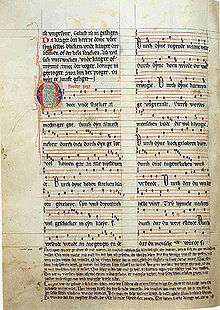Spruchdichtung
Spruchdichtung or Sangspruchdichtung is the German term for a genre of Middle High German sung verse. An individual work in this genre is called a Spruch (plural Sprüche), literally a "saying", and may consist of one or more strophes.[1]

While closely associated with the lyric genre Minnesang, its theme is not love, but rather
the Spruch treated predominantly of rational, didactic and pragmatic issues, including, for example, socio-political commentary, topics related to moral or religious teaching and philosophy, practical wisdom, biographical material, praise of patrons, begging and much else besides.[2]
Where the texts offer general moral comment, they may also be considered gnomic poetry, while works directed at particular personages or issues are rather political poetry.
The most important medieval collection of Sprüche is the Jenaer Liederhandschrift (MS J), which also has a large number of Spruch melodies.
The Poets
The main poets working in this genre are:[3]
- Spervogel
- Herger
- Walther von der Vogelweide
- Bruder Wernher
- Der Marner
- Konrad von Würzburg
- Heinrich von Meißen (Frauenlob)
- Reinmar von Zweter
Notes
- Garland & Garland 1976, p. 815.
- Klippenberg.
- Dunphy, pp. 845–6.
References
- Dunphy, Graeme (2000). "Sangspruchdichtung". In Konzett, Matthias (ed.). Encyclopedia of German Literature (first ed.). London, England: Fitzroy Dearborn Publishers. p. 977. ISBN 1-57958-138-2. Retrieved 12 August 2017.
- Garland, Henry Burnand; Garland, Mary (1976). The Oxford Companion to German Literature. Clarendon Press. ISBN 978-0-19-866115-3.
- Kippenberg, Burkhard. "Spruch". Grove Music Online. Oxford University Press. Retrieved 12 August 2017.CS1 maint: ref=harv (link)